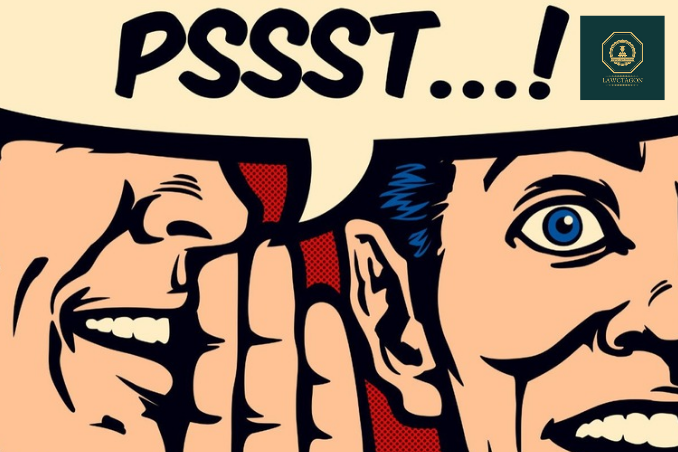Defamation
Shreya from Institute of Law, Kurukshetra University
5/29/20245 min read


What is defamation?
A man’s reputation is his most valuable property. An injury to his reputation is known as defamation. It occurs when a person intentionally states or spreads information about another person bringing him denouncement. It can either be in a permanent form or a transient form.
As per Section 499 of IPC{1};
Whoever,
by words either spoken or intended to be read or by signs or by visible representations,
makes or publishes any imputation concerning any person
intending to harm, or knowing or having reason to believe that such imputation will harm, the reputation of such person is said to defame that person.
Types of defamation
There are two types of defamation:-
LIBEL & SLANDER
LIBEL
Libel is defamation which is in permanent form such as in writing, printing, pictures etc. It occurs in cases of a defamatory statement in the newspaper, magazine or television.
SLANDER
Slander is defamation which is made in a non-permanent or a transient form. It may be spoken by words or gestures.
Whether defamation is a civil or criminal wrong?
As per Indian Law, there is no distinction between libel and slander. In case of either libel or slander, action can be taken as civil or criminal wrong. Law of Torts deals with civil disputes of defamation while criminal defamation is covered under Section 499 of IPC.
In contrast to this, English Law makes a distinction between libel and slander. Libel is considered actionable per se but slander is not recognized as an offence until there is proof of special damage.
Essentials of defamation
THE STATEMENT MUST BE DEFAMATORY
A statement is said to be defamatory when it is likely to lower the reputation of a person in the opinion of right-thinking members of society.
A statement can either be a prima facie defamatory or may have a hidden meaning (innuendo) that is defamatory. In this case, It is not necessary that the person has the intention to make a defamatory statement.
THE STATEMENT MUST REFER TO THE PLAINTIFF
If the plaintiff complains of any statement to be defamatory then he has to prove that the statement referred to him. It is important what the people exposed to the statement believe. If they think it referred to the plaintiff, it will be defamation.
In case a defamatory statement refers to a group of individuals, it is also essential for the plaintiff to prove that the statement refers to him.
Action against defamation of a dead person can be brought under criminal law. The law of torts doesn’t deal with defamation of the deceased.
THE STATEMENT MUST BE PUBLISHED
Basically, Publication here means making the defamatory statement known to some person other than the one who is defamed. No civil action can be taken until and unless the statement is published.
Communication of any defamatory statement from husband to wife or vice versa is not considered publication because in the eyes of law, husband and wife are one person. At the same time, the communication of a defamatory matter of a husband to his wife is publication or vice versa.
Defences to defamation
TRUTH
In a civil action for defamation, merely proving that the statement was true is a good defence. The reason for the defence is that “ the law will not permit a man to recover damages in respect of an injury to the character which he either does not or ought not to possess”{2}
Under criminal law, merely proving the statement to be true is not a complete defence. There is an exception under Section 499 of IPC that along with the statement being true, it must be proved that it was made for public good.
In a case, the defendant, who was an editor, printer and publisher of a newspaper, published a series of defaming articles making serious allegations and imputations against the plaintiff, who was a Block Development Officer. He alleged the plaintiff for issuing false certificates, accepting bribes and adopting corrupt and illegal means in various ways. The plaintiff brought an action against the defendant. The defendant could not prove that the allegations made by him were true and therefore, he was held liable.[Radheshyam Tiwari V. Eknath]{3}
FAIR COMMENT
If one is expressing an opinion rather than stating the facts in a matter of public interest then no action can be taken for defamation. It is necessary that the comment i.e. the opinion must be fair and in the public interest.
A comment is based upon certain facts. Therefore, a comment cannot be fair if it is based on facts which are not true. So, before making a plea of fair comments, a defendant has to prove the truth of the facts upon which his comments are based.
In a case, the president of a company filed a defamation suit against some publishers, who had published articles which discussed the deterioration in performance by the management of the company, seeking permanent injunction and damages. The court held that the articles were non-defamatory because of the absence of ill feelings towards the plaintiff and moreover, it was said that the articles contained mere fair comments on the company’s performance.[K.S. Sundram V. S. Viswanathan]{4}
PRIVILEGE
In some situations the law allows certain statements to be made that would normally be defamatory. These situations are “privileged” by the law.
Absolute privilege
In matters of absolute privilege, a statement can be false and can be made maliciously. It is not actionable. Absolute privilege is recognized in parliamentary proceedings as well as in judicial proceedings.
Defendant gets absolute exemption from the liability.
Motive doesn’t matter.
Qualified privilege
Unlike absolute privilege, in cases of qualified privilege, a statement must be made without malice. It should be made in the discharge of a duty or protection of an interest.
Defendant gets conditional exemption from the liability.
Motive must not be improper or evil.
Defamation & Freedom of Speech and Expression
Article 19(1)(a) of the Constitution of India {5} guarantees freedom of speech and expression to every citizen of India. But this freedom is not absolute. There are certain restrictions on it. Defamation is one of them.
Freedom of speech and expression doesn’t mean the freedom to defame. The same goes with the Freedom of the Press. It is expected from journalists to be careful and cautious while making reports.
As in the case of Dr Shashi Tharoor V. Arnab Goswami,{6} the court held that it is the function and right of the media to gather and convey information to the public. It also has a right to comment on the administration of justice but journalists should investigate before making any comment. They are not free to pronounce anyone guilty and/or pre judge the issue and/or prejudice the trial.
Conclusion
Defamation laws in India encompass both libel (written) and slander (spoken), holding perpetrators accountable under civil and criminal provisions. With the rise of social media and online platforms, there's a pressing need for these laws to adapt to the digital age, where misinformation can spread rapidly. This evolution requires striking a balance between protecting individuals' reputations and upholding the right to free speech. It underscores the importance of responsible communication for both journalists and the public, emphasizing that freedom of expression should not be misused to unjustly harm others.
References
{1} Indian Penal Code,1860
{2} Mc. Pherson V. Daniels,(1929) 10 B. and C. 263,272, per Littiedate, J.
{3} A.I.R. 1985 Bom. 285
{4} A.I.R. 2013 (NOC) 216 (Mad.)
{5} Constitution of INDIA; Article 19(1)(a)
{6} A.I.R. 219 (NOC) 134 (Del.)


